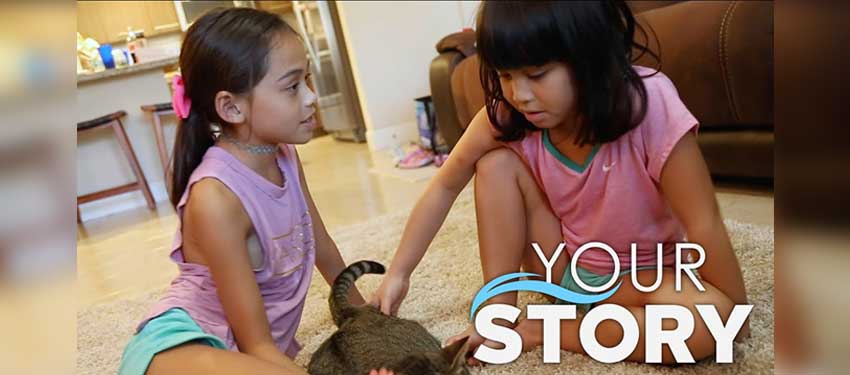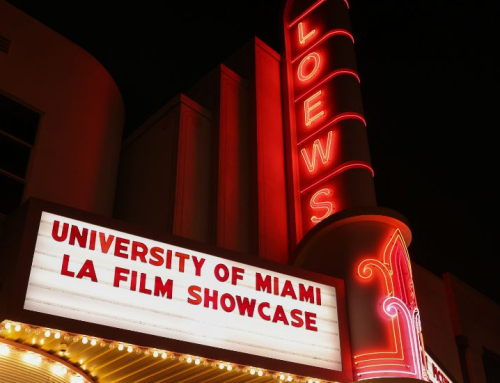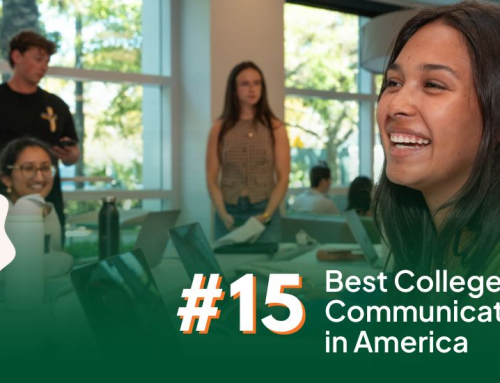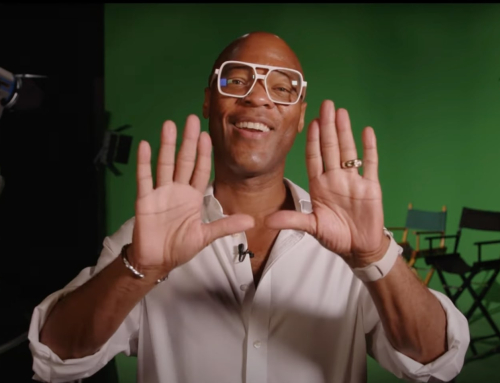By: Karina Valdes
The relationship between sisters is a special one and Mischa and Micaela’s is no different. The siblings spend countless hours playing, singing, and dancing together, but Mischa and Micaela’s relationship is all the more unique due to Micaela’s diagnosis of autism. In a documentary short created by students from a class co-taught by two University of Miami professors, Mischa and her family share their story.
“Mischa has had to grow up a little bit faster than she’s supposed to, but what’s been so beautiful is watching Micaela grow with her role model, her sister,” said Julie Salkin, Mischa and Micaela’s mother.
In the Your Story segment that aired during Your South Florida on South Florida PBS, the Salkins talk about their family’s journey raising a child with autism. The video was produced by School of Communication and UM science students taking Science Documentary: Autism, a class co-taught by Jim Virga, associate professor of professional practice for the Department of Cinema and Interactive Media, and Julia Dallman, associate professor for the Department of Biology. Virga taught the students how to develop the documentary and use the camera equipment, and Dallman taught the science behind autism spectrum disorder.
“What we try to do is expose students from both science backgrounds and communications backgrounds to some of the basic biology and genetics of what we know about autism so that they can engage with people in the community who are impacted by autism either as caregivers or therapists, or the kids themselves and adults that have autism,” said Dallman.
Students in the class were split into teams and then worked to find members of the ASD community to interview.
“The students go and spend time with the subject, they come back and they propose a story, and then we help them focus the story,” said Virga.
The videos have a real deadline through a relationship formed with alumna Charlotte Cushing, B.S.C. ’15, who works as a multimedia producer at South Florida PBS. During the semester, Cushing visited the class and helped the students with the story and post-production. During April, which is National Autism Awareness Month, the documentary shorts were aired on South Florida PBS, and were also shared on the station’s YouTube channel and Facebook page.
Ezra Remer, a senior majoring in motion pictures, took the class in 2018 and calls the South Florida PBS collaboration “a blessing.”
“Not often do student films get any sort of widespread recognition for our work, so getting shown on a television channel far surpassed anything I had dreamt of for my college experience. Also, getting mentorship from Charlotte Cushing at South Florida PBS was very beneficial to identifying my path forward in meaningful film production,” said Remer.
The unique class was developed by Virga and Dallman after they worked together along with another School of Communication professor to develop a video on Dallman’s research and lab where she uses zebrafish as a model for autism.
“I was leery of [a video on my research] to be perfectly honest because I didn’t want my science to be turned into something I didn’t feel comfortable with, but it was such a great experience and so I felt like that relationship between communications and science was a valuable one to develop further for the students,” says Dallman.
For Virga, the nexus of science and communication is what makes the class interesting.
“I’ve taught other documentary courses, but working with Dr. Dallman on this specific subject matter has been such a great collaboration,” said Virga.
Amanda Jaegar, B.S.C. ’19, who took the class in 2018, felt that the combination of science and communication provided an opportunity for students to delve into a subject that is outside of their major, leading to a more comprehensive education. Jaegar had to learn concepts such as DNA and genetics that were basic to the science students, but not to her. On the other hand, science students had to learn how to use a camera and film equipment, developing skills that are second-nature to motion picture students.
“In my opinion, both sides were challenged to branch out of our comfort zones, work together and utilize each other’s strengths, and become better-rounded students,” said Jaegar.”
Jaegar found working with the documentary subjects the most interesting aspect of the class.
“The family that I worked with was kind enough to allow me and my crew to enter their homes and witness firsthand the day-to-day life of a nonverbal autistic child and his family. It was the first time that I was given such an opportunity and it helped me value both the joys and struggles that come along with autism, both in the familial and political setting, “ said Jaegar.
Remer says he took the course to strengthen his documentary skills under the guidance of Virga and admits he had little interest in the topic of autism.
“However, once the class started and we learned about the history and science behind autism spectrum disorder from Dr. Dallman, I was immediately captivated by the more scientific aspect of the course as well,” said Remer.
Remer also appreciated the chance to receive input from students who did not have a motion pictures background.
“My personal philosophy when making films is to make sure that my work is tailored to non-filmmakers. Getting the opportunity to get a perspective outside of the film school was invaluable during the production of this documentary short,” said Remer.
Phoebe Cohen, who is pursuing both a Bachelor of Science in Psychology-Neuroscience-Philosophy and a Bachelor of Music in Double Bass Performance, took a different iteration of the course in fall of 2016 that focused on music and the brain. As a student with a unique background in music and in science, this course was a perfect combination of disciplines for Cohen. In that course, Virga and Dallman explored the effect of music on a brain with Parkinson’s disease.
“We had to interview people from the community and we created a 12 minute mini-documentary about music therapists in South Florida. We interviewed a music therapist about her work with Parkinson’s, and we got to go to the Parkinson’s music therapy sessions and to meet all these different people,” said Cohen.
The documentary Cohen helped develop, The Music Lady, was entered in various film festivals on campus and around the nation. She notes the importance of scientists and communicators working together to effectively share scientific information that everybody can understand.
“Scientists are drawn to the fact that their work is supposed to do good for the world, but if the lay person can’t understand it, it’s purposeless more or less. Having the artists come in and pare down that really intense neuroscience lecture to a film that anyone can understand, that is the power of this class,” said Cohen.
Science Documentary is offered in the fall and alternates between two topics; Music and the Brain and Autism. This semester, students are working on developing autism documentaries.
“I just think that any time students go out into the real community and connect with people, that’s the best type of education,” said Virga.
Visit com.miami.edu to view more documentaries created by students.







